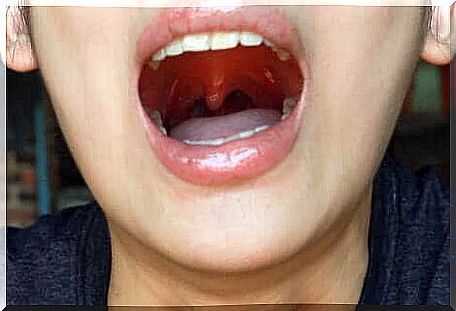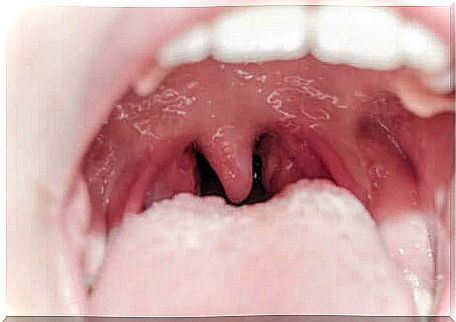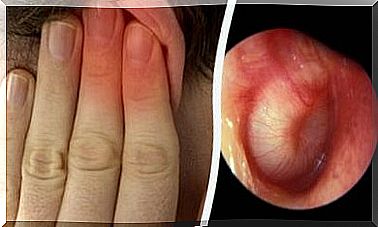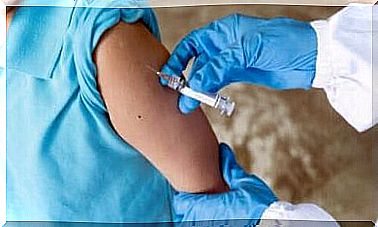All About Uvulitis And Why It Can Occur

Uvulitis is inflammation of the uvula, a small spindle-shaped muscle that hangs down from your soft palate or the back of the palate. Infections, allergic reactions, injuries after certain medical procedures or the use of unsuitable substances are the usual causes of uvulitis. If you want to know everything about uvulitis, read this article!
What is uvulitis?
Uvulitis is an inflammation of the uvula. This swelling can be caused by both infectious and non-infectious processes. According to the National Cancer Institute (NCI), the uvula is the soft flap of tissue that hangs down at the back of the mouth, at the edge of the soft palate.
While experts thought this structure was rudimentary, they’ve found it has a clear function: it helps prevent food from entering the nasal cavity.
The medical website Medigraphic defines uvulitis as “ an acute inflammation of the uvula causing erythema, edema, pain and fever. It is worth noting that while bacterial or viral infections are the most common cause of this condition, they are not the only possible causes.
What are the causes of uvulitis?

According to the United States National Library of Medicine , uvulitis is primarily caused by an infection with streptococcal bacteria. This is a group of bacteria that are pathogenic to humans.
Up to 30% of acute pharyngitis cases are associated with Streptococcus pyogenes. Pharyngitis is a disease strongly related to uvulitis.
Other pathological infectious agents that can cause this disease are Haemophilus influenza type b (Hib) and Streptococcus pneumoniae (pneumococcus).
In addition, infectious uvulitis is more common in young school-aged children and is quite seasonal, especially in temperate regions. The peak of sensitivity is at the age of five, 10 and 12 years.
Infectious uvulitis is not the only possible variant of this condition. Meanwhile, the non-infectious type can be caused by the following situations:
- An injury to the back of the throat.
- An allergic reaction to allergens such as dust mites, pollen, house dust, dead skin cells from pets, or certain foods.
- Accidentally inhale or ingest certain toxic elements.
- Surgery, such as removing the tonsils (tonsillectomy) and other medical procedures, such as an endoscopies.
- To smoke.
The symptoms of uvulitis
The suspicion that a person has uvulitis arises if there is an acute infection when the uvula is the most swollen structure compared to the pharynx. Especially if the person also has a mild fever. Some of the most common common symptoms include:
- Fever, if the condition is caused by an infection.
- The feeling of having something in the throat, accompanied by the feeling of choking or gagging.
- Cough.
- Painful swallowing.
- Excessive saliva production.
- Little appetite.
The patient suffers from strep throat if the symptoms of uvulitis do not disappear after a few days or if white spots appear on the back of the oral cavity. While this is much more common in children, it can also manifest in adults.
Diagnosis and Treatment
Several diagnostic tests are available to identify the underlying causes of uvulitis. We list a few of these research options below:
- blood tests. They may be necessary to assess the patient’s general health as well as to rule out certain problems.
- throat culture. A sample of the oral mucosa is obtained and then cultured in a specialized medium. This allows you to detect possible germs that cause uvulitis, if it is infectious.
- Allergy test. The swelling of the uvula may be the result of an allergic reaction. It is important to detect the allergen as it can help prevent this clinical picture and other much more serious reactions, such as anaphylactic shock.
- X-ray of the neck. Especially suitable for patients who have difficulty swallowing.
Treatment depends on the underlying cause. If the patient has bacterial uvulitis, the doctor will prescribe specific antibiotics to fight the pathogen. If the condition is caused by an allergic reaction, the patient should take an antihistamine. Steroids can help reduce swelling if necessary.
What can you do if you have uvulitis?

According to the UF Health website, the patient can take several measures at home to improve their symptoms in addition to the treatment prescribed by the doctor. Measures that you can apply at home include:
- Take a lot of rest. Uvulitis may resolve on its own or with treatment within one to two days.
- Drink plenty of fluids and gargle with warm salt water to reduce swelling.
- Use sprays that help relieve an itchy throat.
- Take over-the-counter pain relievers. They reduce the pain caused by the swelling of the uvula.
- Do not smoke and avoid inhaling smoke as it can cause throat irritation.
Follow your doctor’s instructions
As you have read, uvulitis is a sign of another underlying condition and is not a disease in itself. The causes of uvula swelling can be very diverse and range from infections to allergies.
In general, this condition clears up within one to two days with proper treatment. Treatment depends on the underlying cause, as bacteria are not treated in the same way as allergic inflammation.









